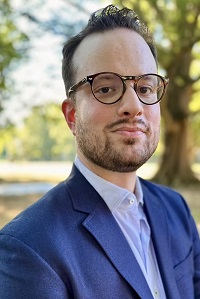Joseph Boselovic joins W&M
 This fall, the School of Education welcomes new faculty members. Today, we introduce Joseph Boselovic, who is a postdoctoral research fellow at The Institute for the Study of Education, Democracy & Justice.
This fall, the School of Education welcomes new faculty members. Today, we introduce Joseph Boselovic, who is a postdoctoral research fellow at The Institute for the Study of Education, Democracy & Justice.
Tell us a little about your background and what brought you to W&M.
Prior to coming to the School of Education, I earned my Ph.D. in sociology from Johns Hopkins University as well as a master’s degree from the University of Pennsylvania Graduate School of Education. I also have experience working in a range of different educational roles, including being a first-year staff member at one of the first ‘diverse-by-design’ charter schools in New Orleans.
My career as a qualitative sociologist and educational researcher, however, started in Professor Jamel Donnor’s Foundations of Education course. As both a William & Mary alum and a native of Virginia, I am grateful for the opportunity to continue my research here and to have the opportunity to teach and learn alongside the next generation of educators, leaders and researchers at the School of Education.
What’s your area of research and what question are you most passionate about answering right now?
My research broadly focuses on schooling, parenting and inequality, with a specific interest in the enduring nature of school segregation in the United States.
In my current project, I examine how low-income families chose and assessed schools within the context of an experimental housing intervention in Seattle that provided supports to help families move to lower-poverty neighborhoods with higher-performing schools. This work is animated by two questions. First, what are the social processes that result in families of different class and racialized backgrounds often attending such qualitatively different schools? Second, while researchers and policymakers often make assumptions about what makes a ‘good’ school, how do parents think about and assess school quality? Beyond shedding important light on these questions around school choice and school quality, this work also points to important avenues where housing and educational policy might make more of an impact in addressing inequalities in children’s schooling contexts.
I’m also developing a project that will explore how white and Black middle-class parents are choosing schools and raising their children in an era of increasing economic insecurity, social change and political polarization. At a time where the prospects of their children achieving a middle-class life through a quality education are becoming less certain, I’m wondering how they negotiate this challenge and the potential implications for school segregation and public education more broadly.
What else are you hoping to get involved with on campus or in the community?
On campus and in the community more broadly, I’m curious to get more familiar with the work being done around the Local Black Histories Project. Being able to make clearer historical connections between current and past racial inequalities in our local schools opens avenues for important research and can also provide creative opportunities for the classroom.
Anything else you’d like to share?
When I’m not doing research or teaching, I enjoy reading fiction (I was an English major, after all), listening to jazz, cooking and birding.